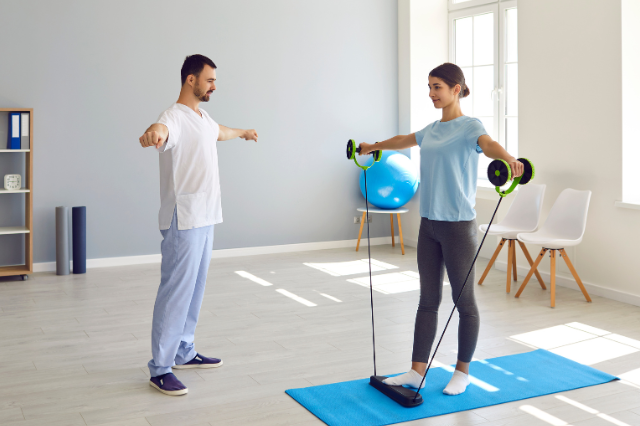
A home loan for nurses is specifically designed to recognise the unique needs of healthcare professionals. These specialised home loans offer competitive interest rates, higher borrowing capacity, and, in many cases, waived Lenders' Mortgage Insurance (LMI). The goal is to help nurses secure their own homes with lower upfront costs. With the fast-moving property market, these benefits ensure that registered nurses, allied health workers, and medical specialists can confidently enter the market.
Ausfirst Lending is committed to empowering healthcare workers with personalised support and expert guidance. Whether you're buying your first home, refinancing for a discounted interest rate, or investing in an investment property, our Brisbane mortgage brokers work closely with you to match your loan options to your financial situation. We navigate the loan process, assist with financial documents, and liaise with many lenders to ensure you qualify for the lowest rates available.
With access to a full range of financial institutions, we help nurses secure the best loan amount, whether they have casual income or self-employed status. From pre-approval to conditional approval, our friendly team simplifies the application process, ensuring you can move into your dream home sooner.
Let Ausfirst Lending help you borrow smarter, access reduced fees, and take advantage of LMI waivers for eligible nurses. Get started today and take the next step towards securing your new home with confidence.
Mortgage options for nurses in Australia come with several perks:
Nurses often qualify for reduced interest rates compared to standard home loan products. These discounts can lead to significant savings over the life of the loan by lowering monthly repayments, making nurse home loans a more cost-effective option.
Many Australian lenders offer LMI waivers to nurses, allowing you to borrow up to 90% or even 95% of the property’s value without needing LMI. This can save you thousands of dollars in upfront costs, which is a substantial financial relief when looking to buy or refinance a property.
Your stable and often high-demand profession makes lenders view you as a low-risk borrower, typically resulting in a higher borrowing capacity than ordinary home loan applicants.
Many nurse mortgages come with flexible features that make managing a mortgage easier. These features include redraw facilities, which allow you to access extra repayments, and offset accounts, which can reduce the interest paid on the loan. This flexibility gives you greater control over your finances, ensuring you can adjust your repayment strategies as needed. Read More
While the benefits of a nurse home loan are clear, it is crucial to be aware of the risks involved, so you can make smarter decisions. Knowing these risks can help you navigate the mortgage process more confidently and avoid potential financial pitfalls:
Although nurses tend to have a higher borrowing capacity, it’s advisable to avoid committing to a loan larger than what you need. Otherwise, you might face difficulties meeting your repayment obligations, especially if unexpected expenses arise.
Nurses often work variable hours, with shifts that can result in fluctuating incomes. This unpredictability can make it more challenging to maintain consistent mortgage payments. When considering a nurse home loan, be sure to assess how stable your income is over time and whether it can comfortably cover your repayments during quieter periods.
If you opt for a variable-rate mortgage, be prepared for possible fluctuations in interest rates. When rates rise, so do your monthly repayments, which could put a strain on your finances. It’s essential to evaluate whether you can manage potential rate increases or if a fixed-rate loan would provide more security for your situation.
To qualify for a home loan for nurses, you must meet specific criteria. Lenders assess the following factors to determine your ability to manage and repay a mortgage:
Lenders typically require applicants to be registered nurses or healthcare professionals, which may also include midwives, paramedics, and other allied health workers. Full-time, part-time, and casual nurses may be eligible, but casual nurses generally need to demonstrate a longer and more stable employment history to qualify.
Most lenders require applicants to be an Australian citizen or permanent resident to apply for nurse home loan in Australia. However, some lenders may also consider nurses on temporary visas, such as the 482 or 457 visas, although stricter conditions – such as providing a larger deposit (often 20-30%) or having an Australian citizen or permanent resident as a co-borrower – may apply. Make sure to confirm these specific requirements with your mortgage broker, as each lender has its own loan policies and options.
Lenders evaluate your income, including base salary, overtime, and allowances, to ensure you can manage the repayments. For those in casual or contract positions, proving steady income over a longer period may be necessary. Consistency is key, as it assures lenders that you can handle a mortgage despite any income variability common in shift-based roles.
A strong credit history is essential in home loan applications. Aside from increasing your chances of approval, maintaining a good credit score lets you secure a loan with better terms, such as reduced interest rates and waived LMI.
Applying for a nurse home loan involves several key steps to ensure you secure the best mortgage option for your situation. Here’s a breakdown of the process:
For Employed Nurses
For Self-Employed Nurses
At Ausfirst Lending, we understand the specific financial needs of nurses and how demanding your schedules can be. That’s why we offer specialised nurse home loans, making it easier for you to achieve your homeownership dreams.
Our experienced brokers provide personalised support throughout the entire loan process. We guide you through every step, from navigating loan options to securing your loan and beyond, so you can focus on your career while we handle the complexities of your home loan journey.
At Ausfirst Lending Group, you are our top priority. We are dedicated to providing comprehensive assistance from start to finish, not just because we are legally obligated to act in your favour, but because we genuinely want to ensure your success.
We focus on your objectives and requirements, and combine deep industry knowledge with a strong commitment to finding loan options that truly align with your financial needs. We simplify the entire loan application process by assessing your borrowing capacity, organising documentation, and negotiating terms on your behalf, all while securing the most favourable outcomes for you.
While some financial services may come with hidden fees, working with us ensures you won't pay out of pocket for expert advice. Our service is free for you because we receive compensation directly from the lenders, allowing you to focus on finding the best loan without worrying about additional costs. We maintain transparency throughout the process, so you always know where you stand.
One of the key benefits of working with Ausfirst Lending is our access to a diverse range of lenders. Instead of presenting just one option, we assess a broad array of options to secure a loan tailored to your financial needs. This extensive selection allows us to tailor solutions that match your specific goals and circumstances, ensuring you get the best possible outcome.
Our knowledge of the property market in Brisbane is unparalleled, and we have been helping residents buy property for years. Our mortgage brokers in Brisbane aren't just professionals; we’re local experts who understand the intricacies of the area's property market. This local knowledge means we can provide insights and advice that are particularly relevant to your situation. Additionally, our connections in the industry may help you access special discounts or benefits, giving you an edge when securing a loan. Read Less
Whether you're a first-time buyer or building a portfolio, Ausfirst Lending delivers personalised solutions for medical professionals. Start the process today and experience expert service with no out-of-pocket fees.


Get started on your homeownership journey with our first home loan options, crafted to help you secure your dream home.
Explore First Home Loans
Explore our investment loan solutions designed to help you build and grow your property portfolio.
Explore Investment Loans
Leverage the equity in your home to unlock funds for renovation, investment, or other financial needs with a home equity loan.
Explore Home Equity Loan
Utilise your self-managed super fund to invest in property with our specialised SMSF loan options.
Explore SMSF Loans
Secure funding for your trust’s investment needs with our trust loan solutions, tailored for optimal outcomes.
Explore Trust Loans
Review and enhance your current mortgage terms with our refinancing options, designed to save you money.
Explore RefinancingSecuring the right loan should be a personal journey, not a transaction. That's why when you choose us, you deal directly with Richard, the founder, who brings over 30 years of hands-on experience managing diverse loan projects across Queensland.
Unlike larger brokerages where you become just another file number, Richard personally oversees every client's loan process—whether you're purchasing your first home, refinancing, expanding your investment portfolio, or acquiring commercial equipment. His extensive industry knowledge ensures you receive tailored advice, a smooth application experience, and solutions that align with your long-term financial goals.
We’re not just mortgage brokers; we’re your trusted lending partners. With a commitment to transparency, accessibility, and genuine care.
In other words, you are not passed between departments—you are looked after by someone who treats your financial success as his own.
Speak to Richard Today →Whether you're buying your first home, refinancing, or exploring loan options through a trust or SMSF, we’re here to guide you every step of the way. As your trusted Mortgage Broker on the Sunshine Coast, we offer personalised advice tailored to your needs.
Location: Suite 3/74 Bulcock St, Caloundra QLD 4551
📍 View on Google Maps
From first-time buyers to seasoned investors, we provide loan solutions designed to align with your property goals and financial situation. We’ll support you every step of the way.
For buyers and homeowners managing their own property needs.

Get started on your homeownership journey with our first home loan options, crafted to help you secure your dream home.
Start Your First Home Journey
Finance your next property with ease using our second home loan options.
Finance Your Next Property
Leverage the equity in your home to unlock funds for renovation, investment, or other financial needs.
Use Equity
Review and enhance your current mortgage terms with our refinancing options, designed to save you money.
Refinance and Save
Adapt your mortgage to suit your changing life circumstances with ease.
Adjust Your Loan Terms
Bridge the gap between buying and selling with short-term loan solutions.
Bridge Your Finance Gap
Explore our investment loan solutions designed to help you build and grow your property portfolio.
Start Investing Now
Utilise your self-managed super fund to invest in property with our specialised SMSF loan options.
Use SMSF to Invest
Secure funding for your trust's investment needs with our trust loan solutions, tailored for optimal outcomes.
Finance with Trust Structure
Unlock exclusive lending opportunities tailored for sophisticated investors ready to scale.
Access Advanced Lending
Live where you love and invest where it counts with our rentvesting strategies.
Learn About Rentvesting
Own your dream holiday retreat with our tailored holiday home loan solutions.
Buy a Holiday Home
Transform your property with renovation loans tailored for projects of any size.
Upgrade Your Home
Finance eco-friendly homes or upgrades with our green loan products.
Go Green with Financing
Secure finance for your business property needs with our commercial loan options.
Finance Your Business
Save thousands by avoiding Lenders Mortgage Insurance with our waived options and find out about our unique loan strategies.
See If You Qualify
Tailored for self-employed professionals and business owners who may not have traditional income verification.
Simplified Documentation Loans
Take advantage of a 100% Offset Home Loan to minimise the interest you pay by linking your savings directly to your mortgage.
Reduce Interest
With a Family Guarantee Home Loan, your parents or close family members can help you enter the property market by using their home equity as security.
Leverage Family SupportWe provide finance options tailored for medical professionals, educators, tradespeople, legal practitioners, and business owners—structured to fit the way you work and earn.
At Ausfirst Lending Group, we understand that healthcare professionals need lending solutions that consider their unique work-life balance. Whether you're a doctor, nurse, dentist, or allied health expert, we deliver personalised loan strategies with LMI waivers and flexible terms. Backed by Richard’s 30+ years of frontline broking experience, we ensure your loan journey is straightforward, transparent, and managed with care.

Designed to accommodate complex income structures like private practice, hospital rosters, and ABNs.
Get Doctor-Specific Rates
Mortgage options that recognise the cash flow patterns of clinic-based professionals.
Chiropractic Lending Solutions
Lending solutions tailored for high-earning professionals with private practice considerations.
Tailored Loans for Dentists
Customised loans for optometrists balancing practice ownership and salaried roles.
Explore Optometrist Packages
Designed to support pharmacists navigating retail, hospital, or business ownership income structures.
Mortgage Options for Pharmacists
Tailored lending for physiotherapists in private clinics or mobile practices.
Loans Designed for Physio
Loan programs suited to private practice psychologists and those in multidisciplinary clinics.
See Psychologist Lending BenefitsEducators—from early childhood specialists and school teachers to university lecturers and support staff—deserve mortgage solutions that recognise their contribution. We offer home loans with exclusive benefits and flexible terms, making the process seamless so you can focus on your students and career.

Mortgage solutions that support educators with steady incomes and eligibility for LMI waivers.
Discover Teacher ProgramsIf you work in policing, emergency response, legal services, or the defence forces, you deserve a home loan process that understands your role. Our lending solutions are designed to accommodate the demands of public service careers, providing exclusive benefits, flexible repayment structures, and personalised assistance.
From police and emergency responders to lawyers and military personnel, we’re here to simplify your home buying journey with loan options aligned with the realities of your profession.

Structured home loans for legal professionals with scalable borrowing capacity as careers progress.
See Legal Lending Benefits
Reliable mortgage options designed for law enforcement with steady service incomes and allowances.
Secure Police OffersFrom project-based tradies and self-employed business owners to accountants with layered income and contract-based engineers, we craft loan solutions that align with your earning patterns, cash flow cycles, and professional ambitions.

Flexible lending for self-employed tradies with fluctuating incomes and contractor work history.
See Tradie Home Loans
Flexible lending tailored to business owners and freelancers with variable documented income.
Apply as Self-Employed
Structured loan solutions designed for accountants with layered income sources and business deductions.
See Accountant Lending Solutions
Lending options structured for engineers with contract-based or salaried employment structures..
Loan Packages for EngineersOur streamlined loan process ensures you're guided from initial consultation through to settlement and ongoing support. We handle the details, so you can focus on securing the right loan with clarity and confidence.
We begin by understanding your unique goals and needs through an initial consultation (via phone, Zoom, or in person).
We gather key information to validate your financial situation and lay the foundation for the right loan strategy.
We carefully review your options and craft a lending strategy tailored to your specific needs and objectives.
We prepare and submit your application to the lender, ensuring everything is in order.
We manage the settlement process, keeping you informed every step of the way and making sure everything proceeds seamlessly.
We provide continuous support and review, offering updated loan options as your needs evolve over time.


































We don’t just find you a loan that fits; we aim to get one that exceeds your expectations in terms of rates, options, and service.
We work with over 40 lenders, including big banks and non-bank lenders, giving you unparalleled mortgage choice—you have plenty of options to choose the most suitable home loan for you.
Our team is dedicated to guiding you throughout your homeownership journey, whether it’s securing your first home or an additional investment property. We provide ongoing support, including a 6-month review process to keep your loan competitive.
Every mortgage broker on our team has over 10 years of industry experience, ensuring expert advice every step of the way.
We tailor home loan solutions that prioritise your best interests, not the bank’s.
Our entire process is transparent and easy to understand, making the entire journey hassle-free.
Ausfirst Lending Group is proud to be recognised as a finalist in the 2024 Sunshine Coast Business Awards under the Professional Services category, showcasing our commitment to excellence and dedication to serving the community with integrity and expertise.
As a nurse, you can enjoy various benefits with specialised home loans, such as reduced or waived Lenders Mortgage Insurance (LMI), meaning you can borrow up to 90% of the property value without needing to pay LMI. Many lenders also offer favourable interest rates and flexible loan features, which can make your repayments more manageable. Additionally, you may qualify for faster loan approval due to your stable employment in the healthcare industry.
LMI is typically required if your deposit is less than 20% of the property’s value. However, with some nurse home loans, lenders may offer LMI waivers, allowing you to avoid this cost with just a 10% deposit.
When assessing your income for a nurse home loans, lenders take into account your base salary, as well as overtime, shift allowances, and salary sacrificing.
Several banks and lenders in Australia offer nurse home loan options with waived or reduced LMI, particularly for registered nurses and other healthcare workers. The availability of this feature can vary between lenders, so it’s important to consult with a mortgage broker who has access to lenders offering this benefit to nurses.